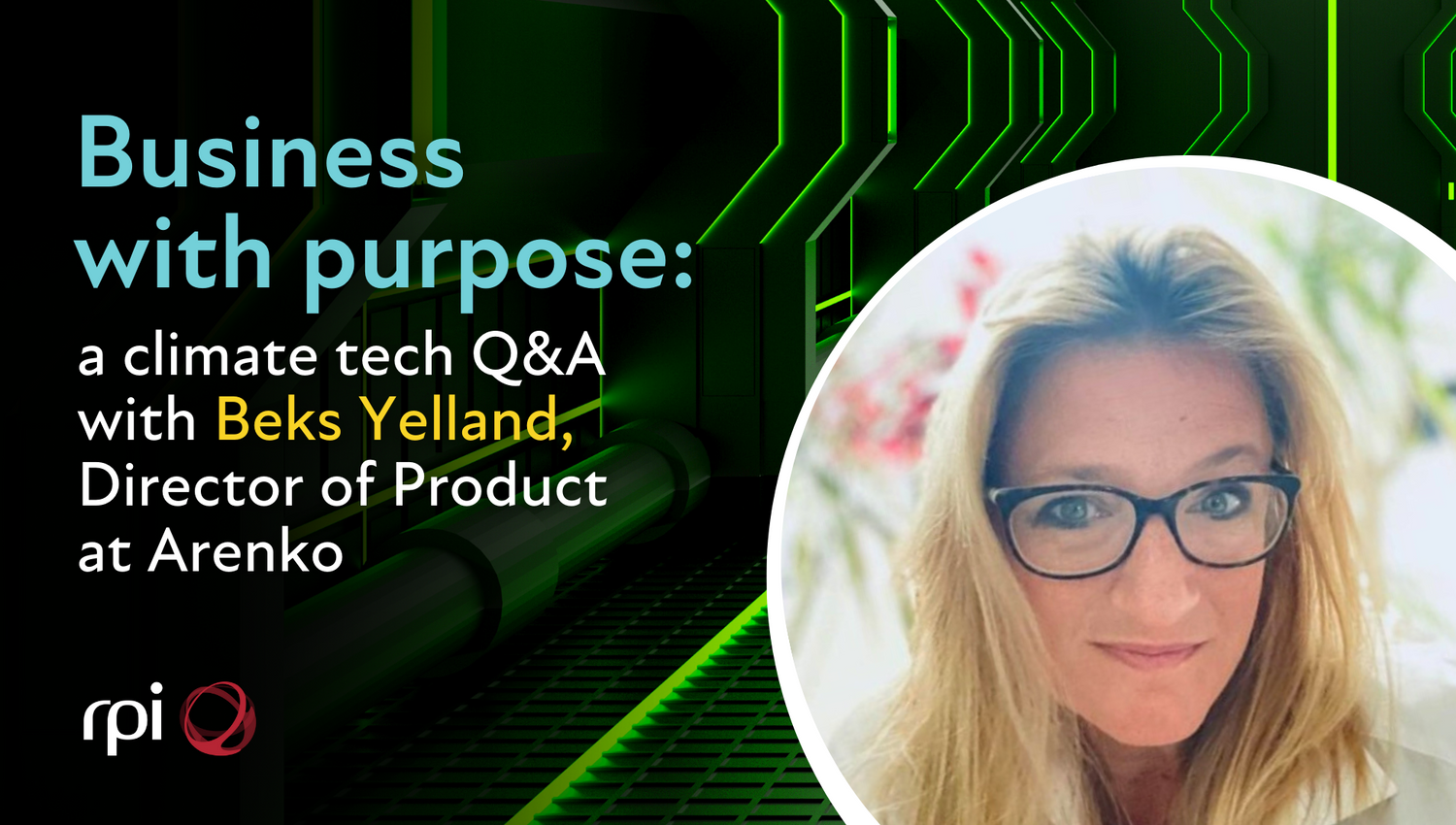Beks Yelland is Director of Product at Arenko, an energy performance and clean energy platform, which enhances the return on batteries and renewable energy sources. We spoke to Beks about starting out in climate tech, what it’s like to work in purpose-driven teams, and what the future holds for renewables, green talent, and the business of green technology.
How did you come to start working in climate tech?
You can reach an inflection point in your career, where you start to wonder, ‘What is it all about? Where am I heading? What do I want to look back on when my career comes to an end?’
My unofficial mentor asked me to visualise myself in 20 years at a dinner table with my friends and family, and imagine them asking me what I’d done, what impact I’d made, and what I was proud of. Well, I wasn’t proud of what I was doing — it didn’t give me any joy. So I started to think, ‘What do I really care about, and where can I make a difference?’
Once I realised that the climate was the way to leave a lasting legacy, and found myself in an organisation with that purpose, there was a palpable difference — the business was mission-led, so it feels like you’re genuinely working with people to solve problems. Also, that kind of organisation attracts phenomenal people who want to be part of the solution, and it makes the process of fixing challenging problems so much more enjoyable.
Can you give an example of those challenging problems?
The renewable storage industry is so new. So too are the technology and the infrastructure, and how sites and entities interoperate. We’re often solving problems that have never been solved before. We’re creating future propositions that people might not yet know they need. Then you have to help them understand how they’ll use it, and how it’s going to create a tangible and meaningful ROI. They want to help solve the climate crisis, but they’re still a business, and things like price, cost, and ROI are going to be the ultimate factor in whether they invest in something.
Has that been your main focus since joining?
My focus at the start was to try and understand how to position our entire end-to-end platform within that context — to figure out how to explain it to customers and how to position it in a way that makes sense to them.
What we've done to assist that is move over to cross-functional teams to allow for the people who use the trading software, for example, to be a part of the software team that builds that solution. We also used to have separate data science and software teams. We've changed that. So now we've got data science embedded within the software teams. Removing each functional discipline’s dependence on separate teams, whilst embedding the functional users of the tool, not only streamlines ways of working but also creates deeper alignment.
You mentioned earlier that businesses are quite understandably interested in ROI. Do you find the motivations of prospects to contain a mix of the ethical and the commercial?
First of all, whatever motivates a business to use climate tech, if they’re using it, then that’s really all that matters for the ‘mission’, so to speak. Those of us in climate tech might be outcome-driven and mission-driven, but not every business we work with will be. Let’s say they’re just doing it because they need to tick a box — I don’t consider that a problem. Yes, it’d be lovely if they shared our values, but if their motivation is financial, it doesn’t really matter as long as through becoming our customer, they are driving us towards our overall outcome, which for Arenko is a zero-carbon grid worldwide.
Are you seeing any trends in climate tech?
Net zero is a long game. I think lots of businesses have visions around what they're going to achieve and by when. The reason deadlines are shifting from the early 2020s to the 2030s (or even later) is that it’s really hard— when we have bold missions, we don’t always know what the solutions are. However, we are going in the right direction, and we’re trying to find those solutions — at the end of the day, that’s what matters.
I also think that longer-term there has to be a shift in hiring. Traditionally, if someone wanted to work in climate tech, they’d have to take a pay cut. As I said, mission- and purpose-driven people are going to be willing to do that, but should people have to make a fiscal sacrifice in order to be part of the solution? I don’t think so. I think this market is developing to a point that they won’t have to.
As for tech-for-good firms, climate tech firms continue to form. As this market grows, so too will the level of competition for these roles, and so companies will have to pay more. Let’s be clear, though — it’s already getting there, and at Arenko we already benchmark to a pretty high level.
Any final thoughts for those thinking about a move into climate tech?
Make sure that when you're looking at an organisation, you understand their mission and their objectives. That sounds obvious, I know, but there’s still a lot of greenwashing out there, so don’t be greenwashed or join a company that does not have any real substance or an achievable mission. If you think something doesn't make sense, or it looks too good to be true, then it probably is. Take the time to research the company’s offering, customers, and market position.
When you choose the right climate tech business, you get to work with the kind of phenomenal people I spoke about. I’ve never met as many PhD grads as I have since being in climate tech, and it’s the same at Arenko. There are so many people with phenomenal qualifications and backgrounds, it makes your eyes water. People like those could go and work for almost anyone, but they choose to work for us because what we are doing is making a real tangible difference now, and will be an incredible legacy to have been a part of. The tech we work on today will likely be superseded tomorrow, so we need to strive to ensure that the tech has a lasting impact on the people and the world around us.
There are Greentech specialists in RPI’s network who are looking for a new role. Contact people@rpint.com.



